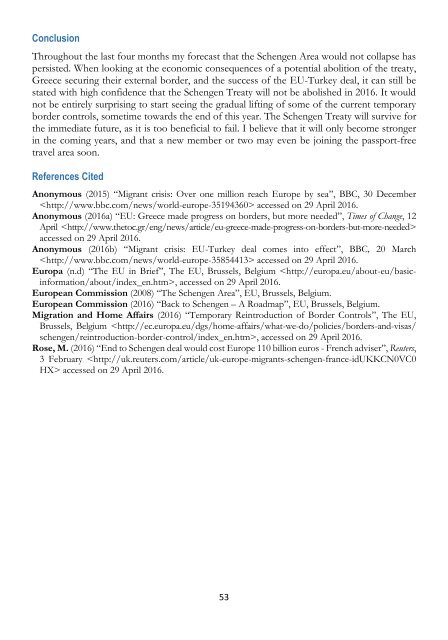The Intelligence Review | vol. 1 | iss. 1 |
This volume is the product of a collaboration between the European Intelligence Academy (EIA) and the Chanticleer Intelligence Brief (CIB), a student-run initiative supported by the Department of Politics at Coastal Carolina University in Conway, South Carolina, United States. Eleven CIB analysts tackle some of the most pressing and timely questions confronting intelligence observers today. Topics range from the price of oil to political stability in Venezuela, from the territorial cohesion of Iraq to the future of the Islamic State, and many other pressing subjects that feature daily in news headlines. CIB analysts propose carefully crafted and informed forecasts that outline future developments in some of the world's most unpredictable hot spots.
This volume is the product of a collaboration between the European Intelligence Academy (EIA) and the Chanticleer Intelligence Brief (CIB), a student-run initiative supported by the Department of Politics at Coastal Carolina University in Conway, South Carolina, United States. Eleven CIB analysts tackle some of the most pressing and timely questions confronting intelligence observers today. Topics range from the price of oil to political stability in Venezuela, from the territorial cohesion of Iraq to the future of the Islamic State, and many other pressing subjects that feature daily in news headlines. CIB analysts propose carefully crafted and informed forecasts that outline future developments in some of the world's most unpredictable hot spots.
- No tags were found...
Create successful ePaper yourself
Turn your PDF publications into a flip-book with our unique Google optimized e-Paper software.
Conclusion<br />
Throughout the last four months my forecast that the Schengen Area would not collapse has<br />
persisted. When looking at the economic consequences of a potential abolition of the treaty,<br />
Greece securing their external border, and the success of the EU-Turkey deal, it can still be<br />
stated with high confidence that the Schengen Treaty will not be abolished in 2016. It would<br />
not be entirely surprising to start seeing the gradual lifting of some of the current temporary<br />
border controls, sometime towards the end of this year. <strong>The</strong> Schengen Treaty will survive for<br />
the immediate future, as it is too beneficial to fail. I believe that it will only become stronger<br />
in the coming years, and that a new member or two may even be joining the passport-free<br />
travel area soon.<br />
References Cited<br />
Anonymous (2015) “Migrant crisis: Over one million reach Europe by sea”, BBC, 30 December<br />
accessed on 29 April 2016.<br />
Anonymous (2016a) “EU: Greece made progress on borders, but more needed”, Times of Change, 12<br />
April <br />
accessed on 29 April 2016.<br />
Anonymous (2016b) “Migrant crisis: EU-Turkey deal comes into effect”, BBC, 20 March<br />
accessed on 29 April 2016.<br />
Europa (n.d) “<strong>The</strong> EU in Brief”, <strong>The</strong> EU, Brussels, Belgium ,<br />
accessed on 29 April 2016.<br />
European Comm<strong>iss</strong>ion (2008) “<strong>The</strong> Schengen Area”, EU, Brussels, Belgium.<br />
European Comm<strong>iss</strong>ion (2016) “Back to Schengen – A Roadmap”, EU, Brussels, Belgium.<br />
Migration and Home Affairs (2016) “Temporary Reintroduction of Border Controls”, <strong>The</strong> EU,<br />
Brussels, Belgium , accessed on 29 April 2016.<br />
Rose, M. (2016) “End to Schengen deal would cost Europe 110 billion euros - French adviser”, Reuters,<br />
3 February accessed on 29 April 2016.<br />
53





